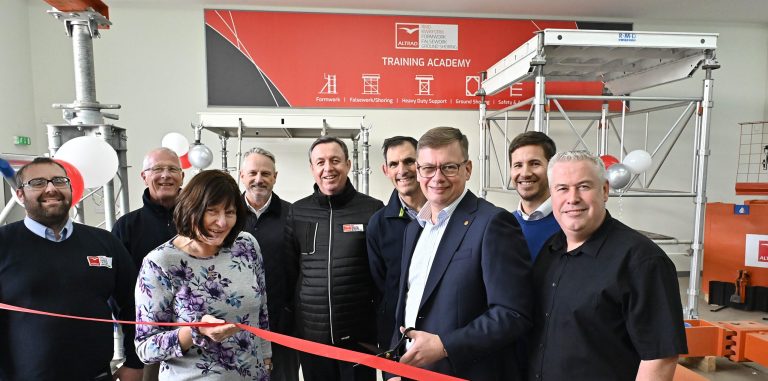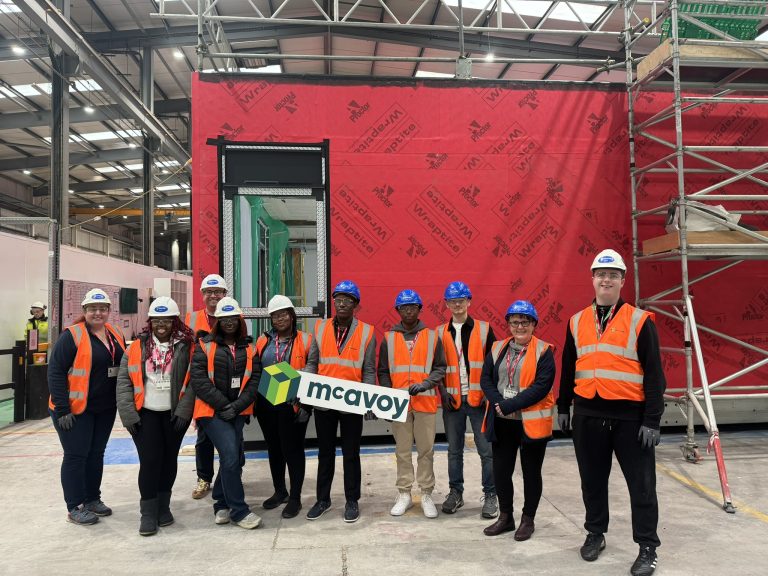Oxford North, the £1.2 billion global innovation district, has reached a significant employment milestone with the creation of its 2,000th construction job since building works commenced in August 2021. The 2,000th employee is Costa Tanasa, who works for Morgan Lovell delivering the fitted laboratories at 2 Fallaize Street and lives near Didcot. Costa first joined Morgan Lovell in 2022 through an agency placement and has since progressed to become a permanent team member, demonstrating the career progression opportunities the project is creating across Oxfordshire. Costa said: “It’s a real privilege to be part of such a prestigious project, where many top-tier construction companies are working together for Oxford North Ventures to build Oxford’s newest landmark. “Working at Oxford North is a great experience, the site has a really positive energy, and there’s a strong sense of collaboration with everyone involved. Morgan Lovell has been focused on delivering high-quality laboratory spaces that reflect the ambition of the wider scheme, and it’s exciting to see how the development is already starting to shape the future of the area. “Being based locally makes it even more meaningful as it’s not often you get to work on a project that’s right on your doorstep.” The landmark figure of 2,000 employees represents a near doubling of construction employment since December 2023, when the scheme reached 1,025 jobs. Significantly, 29% of all roles have been filled by local Oxfordshire residents, nearly double the project’s 15% target set out in its Community Employment Plan agreed with Oxford City Council. The scheme has also created 61 apprenticeships to date, with construction partners which include Laing O’Rourke, The Hill Group, Careys, Mace, Alandale, Maylim, Morgan Lovell, and Flynn James all contributing to the workforce development across the 64-acre site. The district is forecast to boost the economy by circa £150 million per year in GVA. Simon Ruck, managing director of Oxford North, said: “Reaching the 2,000th on-site employee is a tremendous achievement and a real marker of the momentum behind Oxford North as we deliver world-class laboratory and workspace for the UK’s science, technology and innovation sectors. “We’re proud to be creating meaningful opportunities for local residents and supporting the wider regional economy as Oxford North continues to grow. Happy International Men’s Day to Costa and fellow colleagues working at Oxford North!” Oxford North Ventures is the joint venture between Thomas White Oxford, the development company of St John’s College, Ontario Teachers’ Pension Plan and Stanhope. The project collaborates through its Social Value Steering Group, which meets quarterly and includes representatives from Oxford City Council, Enterprise Oxfordshire, Department for Work and Pensions, Oxford Jobcentre Plus, CITB, Aspire, Abingdon & Witney College and Activate Learning. Victoria Collett, development director, Thomas White Oxford and chair of the social value steering group added: “This significant milestone and our latest jobs’ monitoring underscores the tangible social value Oxford North is delivering for people who live locally. We’re not just building infrastructure and buildings; we’re generating opportunities that help people develop new skills and build careers. “Our thanks go to our construction partners and their social value leads who work tirelessly to ensure we exceed our Community Employment Plan commitments through apprenticeships and community outreach.” Councillor Susan Brown, Leader of Oxford City Council said:”Oxford North is a great example of how large, new developments can bring real benefits to our communities. It has created 2,000 construction jobs, with 29% of those roles going to local people, showing the impact of the work Oxford City Council’s Economic Development Team and our Community Employment Procurement Plans (CEPP) can have on making new developments work for local residents. When I visited the site, I also saw firsthand young people gaining valuable work experience. We are working hard to deliver more opportunities like this. “Oxford North has gone beyond the targets we set for them in their Community Employment Procurement Plan, which is fantastic. It shows that it is perfectly possible to bring these jobs to local residents and that there are no limits. I commend the ambition which we would like to see across all major developments. “There is more to do to make sure opportunities, skills training and apprenticeships are being made available for local residents. We are working closely with the Oxford Growth Commission to make sure new developments deliver long-term social value and employment.” When complete, Oxford North will deliver up to one million sq ft of new flexible lab and office accommodation, as well as 480 new homes, a hotel, nursery, three public parks, amenities, and a dynamic seven-day-a-week neighbourhood designed to support the UK’s next generation of science and technology innovators. With Phase 1A now complete comprising 158,500 sq ft of purpose-built laboratory and workspace including The Red Hall, the scheme continues to set new standards for placemaking whilst delivering on its commitment to opportunities and shared prosperity for the region. Storey Consulting acted on behalf of Oxford North Ventures as social value consultancy. Building, Design & Construction Magazine | The Choice of Industry Professionals














